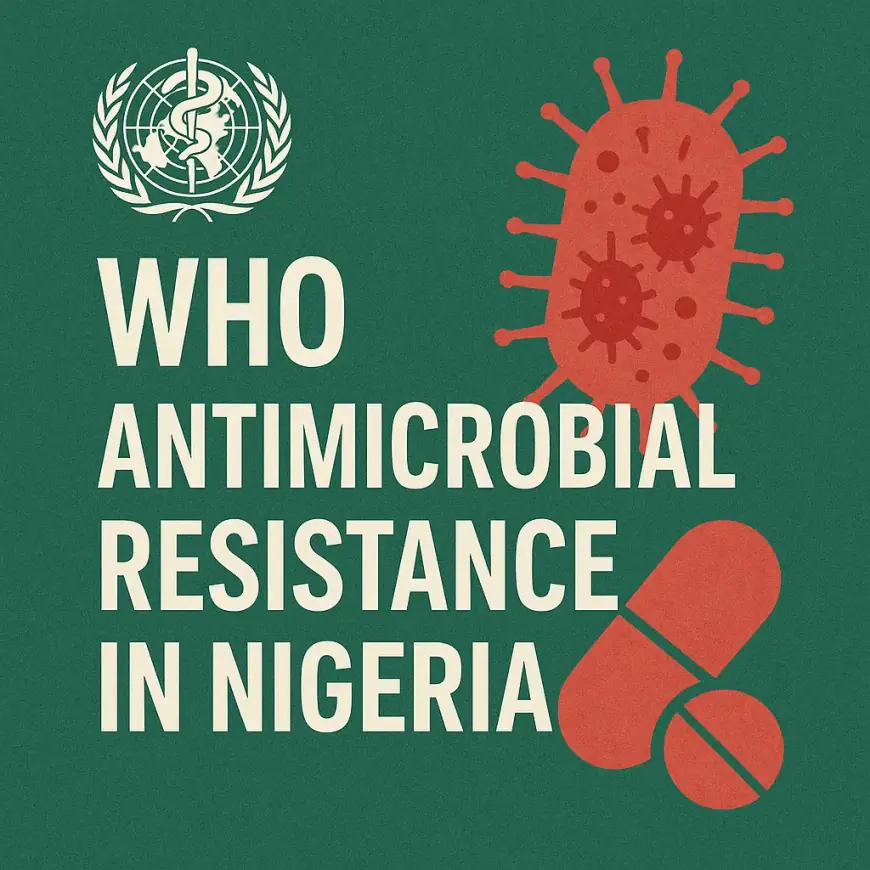WHO Antimicrobial Resistance in Nigeria: A Call for Coordinated Action Through One Health

The issue of WHO Antimicrobial Resistance in Nigeria reflects a critical public health challenge that continues to grow across healthcare systems, communities, and even agriculture. Antimicrobial resistance (AMR) occurs when bacteria, viruses, fungi, or parasites adapt in ways that make medicines ineffective, leading to harder-to-treat infections. In Nigeria, the problem has escalated due to misuse of antibiotics, limited access to diagnostics, poor infection control practices, and a general lack of public awareness.
The World Health Organization (WHO) has been instrumental in supporting Nigeria’s response through policy guidance, surveillance support, and the promotion of antimicrobial stewardship. This article explores the causes, current efforts, and urgent steps needed to reduce the impact of WHO Antimicrobial Resistance in Nigeria.
The Growing Threat of AMR in Nigeria
High Resistance Rates in Clinical Settings
Antibiotic resistance in Nigeria is no longer a distant concern—it’s already affecting treatment outcomes. Common bacteria like Staphylococcus aureus, E. coli, and Klebsiella pneumoniae are becoming increasingly resistant to antibiotics that were once effective. In some studies, methicillin-resistant Staphylococcus aureus (MRSA) was found in over 60% of clinical isolates. Other reports suggest that carbapenem-resistant bacteria are emerging in hospitals at concerning levels.
These resistance trends are not limited to hospitals. They extend into the wider community and even the agricultural sector, contributing to a complex and escalating problem.
What’s Driving the Problem?
Several interconnected factors are fueling antimicrobial resistance in Nigeria:
-
Misuse and Overuse of Antibiotics: Antibiotics are widely available without prescription, and self-medication is common. Many people use antibiotics for conditions like colds or flu, which are viral and do not require such drugs.
-
Poor Diagnostic Capacity: A significant number of healthcare facilities lack functioning microbiology labs. This forces clinicians to prescribe antibiotics without knowing if they are appropriate.
-
Lack of Awareness: Many Nigerians, including healthcare providers, have limited knowledge about AMR. Misconceptions—such as the belief that antibiotics can treat all infections—are widespread.
-
Agricultural Misuse: Antibiotics are often used in animal farming, especially poultry, not only to treat infections but also to promote growth. This contributes to the development of resistant strains that can spread to humans.
-
Weak Regulatory Enforcement: While laws exist to control antibiotic sales, enforcement is inconsistent. Informal vendors and unlicensed pharmacies continue to sell antibiotics without oversight.
WHO's Role in Combating AMR in Nigeria
Recognizing the severity of the crisis, WHO has supported Nigeria in several key areas to fight antimicrobial resistance.
Strengthening Surveillance and Laboratory Systems
WHO has helped establish surveillance systems to collect data on antimicrobial resistance trends across the country. Through initiatives such as the Global Antimicrobial Resistance Surveillance System (GLASS), Nigeria now has sentinel sites collecting data to guide response strategies. Investments have also been made to improve laboratory capacity, enabling faster and more accurate diagnostics.
Supporting the National Action Plan (NAP)
Nigeria launched its first National Action Plan on AMR in 2017 with WHO’s guidance. The plan focuses on five strategic objectives: improving awareness, strengthening surveillance, reducing infections, optimizing the use of antimicrobial medicines, and promoting sustainable investment. A second plan—NAP 2.0—is now being developed with a stronger focus on One Health, which integrates human, animal, and environmental health efforts.
Promoting Antimicrobial Stewardship
WHO has collaborated with Nigerian institutions to promote antimicrobial stewardship programs, particularly in tertiary hospitals. These programs aim to ensure that antibiotics are used appropriately and only when necessary. Healthcare professionals are being trained to follow treatment guidelines and avoid unnecessary prescriptions.
Community Engagement and Education
Public awareness is a major focus of WHO’s support in Nigeria. Educational campaigns are being conducted in schools, communities, and through media channels to improve understanding of AMR. By training young people and community leaders as “health champions,” these programs aim to foster a culture of responsible antibiotic use.
Remaining Challenges
Despite meaningful progress, several obstacles remain in the fight against WHO Antimicrobial Resistance in Nigeria:
-
Incomplete Implementation of the First NAP: While the first action plan laid the groundwork, only about half of its objectives were fully achieved due to limited funding and coordination challenges.
-
Diagnostic Gaps in Rural Areas: Most diagnostic improvements have been focused on urban and tertiary facilities. Rural clinics and primary care centers still lack the tools to properly test for resistant infections.
-
Limited Veterinary Sector Integration: The misuse of antibiotics in animal health continues with little oversight. Very few veterinary professionals consistently conduct antibiotic sensitivity testing before prescribing drugs.
-
Financial Constraints: Most AMR-related programs in Nigeria are supported by international donors. Without sustainable domestic financing, long-term impact may be limited.
-
Enforcement of Regulations: Although guidelines exist for antibiotic dispensing, the informal sale of antimicrobials remains widespread and largely unregulated.
The Way Forward
Tackling WHO Antimicrobial Resistance in Nigeria requires a comprehensive, multi-sectoral approach that goes beyond isolated interventions. Here are key strategies moving forward:
Enforce Prescription Laws
Strengthening enforcement of prescription-only regulations is crucial. Pharmacies and vendors must be monitored, and penalties introduced for unlawful sales of antibiotics.
Invest in Diagnostics
Improving access to laboratory diagnostics, especially in rural and primary care settings, will allow for more targeted treatment and reduce unnecessary antibiotic use.
Promote Stewardship Across All Sectors
Antimicrobial stewardship should be implemented not just in hospitals but also in veterinary practices and agriculture. Training programs, guidelines, and monitoring systems are essential.
Expand Awareness Campaigns
Public education must continue at all levels—from school children to healthcare workers and livestock farmers. Communication strategies should be tailored to local languages and cultural contexts to be more effective.
Strengthen One Health Integration
Coordinating efforts across human health, animal health, and the environment will lead to a more holistic response. Data sharing, joint planning, and policy alignment are needed.
Secure Sustainable Funding
To ensure long-term impact, Nigeria must increase its domestic investment in AMR-related programs. Relying solely on external funding will not be sufficient to sustain progress.
Conclusion
Addressing WHO Antimicrobial Resistance in Nigeria is no longer optional—it is essential for the future of public health in the country. While WHO has provided valuable guidance, tools, and support, the real impact depends on consistent implementation, strong national leadership, and community participation.
By investing in diagnostic systems, enforcing prescription regulations, expanding public awareness, and integrating the One Health approach, Nigeria can begin to reverse the tide of resistance. The road ahead is challenging, but with coordinated efforts and a shared commitment to action, it is possible to preserve the effectiveness of antibiotics and protect the health of future generations.
What's Your Reaction?
 Like
0
Like
0
 Dislike
0
Dislike
0
 Love
0
Love
0
 Funny
0
Funny
0
 Angry
0
Angry
0
 Sad
0
Sad
0
 Wow
0
Wow
0
















































